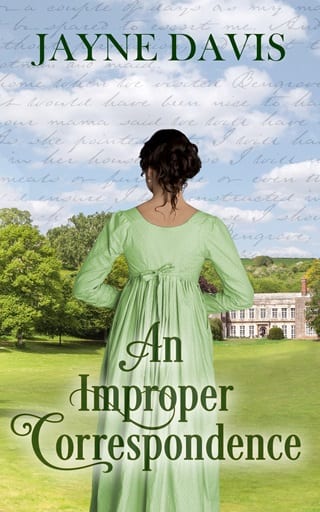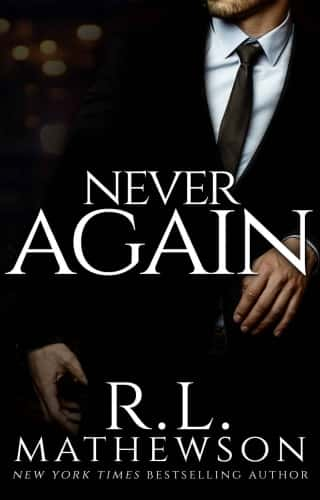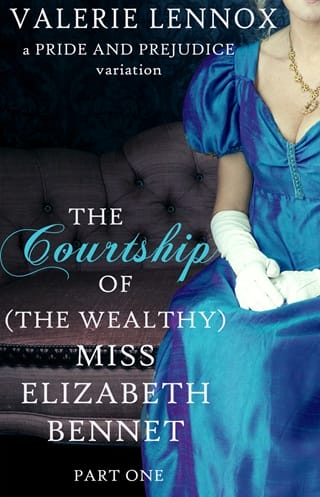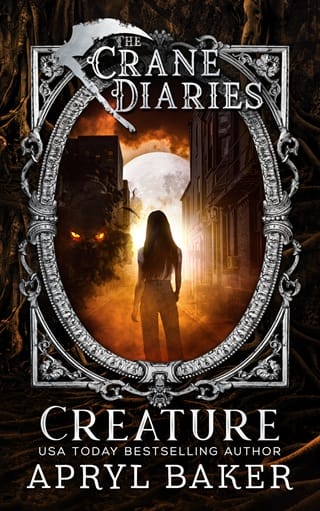Chapter 9
CHAPTER 9
L ondon, July 1813
Jo sat in the window seat of her mother's parlour, enjoying the warm breeze that blew in scents from the garden and reading the letters that had arrived this morning while she had been at the circulating library. Mama, on the sofa, was taking an afternoon nap. There was nothing from Alfred; his last letter had been in response to her making the same offer of assistance she had sent to Captain Delafield, and had thanked her but said that, short of his freedom, his needs in Verdun could be met by having more money. Something his father would deal with, surely.
She unfolded the letter from Captain Delafield first, expecting it to be thanks for the books she had sent several weeks ago. But it was not quite what she expected.
Dear Miss Stretton,
My thanks for sending the French grammar and dictionary, which arrived safely, although the wrapping on the parcel was torn and any accompanying letter seems to have been lost.
Things go on here as normal, except that the warmer weather makes my lack of mobility more frustrating. However that is gradually improving and I can get about the town a little now.
I discovered that Madame Daniau, my landlady, is such a kind hostess because she has two sons of military age. One is fighting somewhere in northern Europe, but the other was captured in Spain. He is an officer, although not of high rank, and according to his letters is being treated well in Cheringford, Somerset. In addition, the infantry unit that captured him prevented him falling into the hands of the Spanish, for which he is truly grateful, and so, therefore, is his mother. Thus good deeds and good feeling are passed on. This amity between the prisoners here and the local people who are, in effect, our gaolers, makes this whole sorry business seem even more stupid and futile.
But my apologies for the digression. I wished to ask your advice as to a suitable gift for Madame. She is forty-five or fifty years of age and wears mourning for her husband who died some years ago. She does not wear jewellery, and in any case such a gift might not be proper. Nor, I feel, would a gift of clothing be appropriate. She regards ornaments merely as objects that collect dust. Any advice you could give me on this matter would be greatly appreciated.
With my best wishes for your health and that of your family,
Yours, with respect,
Capt. R. Delafield
Jo frowned—she had sent more than just the language books. But then she noted again the comment about the parcel having come open and thought that the other items might have been either stolen or confiscated. If her letter were also missing, Captain Delafield wouldn't have known what she had sent—he might just have thought it had proved too difficult for her to obtain the technical volumes.
Could Papa's banking arrangements on the continent be used to send parcels? She would have to ask Papa for permission, although he would expect them to be addressed to Captain Bengrove. She could not explain who they were really for without owning up to writing to someone other than him. Papa might allow her to send the books, as thanks for his help with Alfred's letters, but that would also most likely be an end to their correspondence, and she didn't want that to happen. She was beginning to feel that Captain Delafield was more like a friend than merely a stranger who had helped Alfred.
Could she word her question to Papa so she did not mention the recipient by name?
"Another letter from Alfred, dear?" Mama sat up and rearranged her shawls.
"No, Mama, not today." Jo shuffled the letters together, with Captain Delafield's on the bottom. "One of them is from Aunt Sophie." Papa's youngest sister.
"What does she say? Are the children going on well?"
"They are all thriving. She writes to ask if we want to spend some time with them this summer."
"That would be nice."
"The journey would tire you, Mama. But perhaps we could stay at Yelden for a few days on the way."
"Oh, that is a good idea. I'll ask your father to arrange that. Who else has written to you?"
"Would you like some tea, Mama? Cook made some ginger biscuits this morning—they smelled lovely when I was downstairs earlier." Mama looked doubtful, but Cook's efforts at trying new recipes usually made her at least taste the cakes and biscuits made for her.
Jo got up and rang the bell. She felt a little guilty about distracting Mama from the subject of her letters; corresponding with an unknown man was improper, but it was not as if she were writing to someone her own age. Alfred had said he was old, so she was probably communicating with someone nearer to her father's age than her own. That made it perfectly acceptable, she told herself, although she was careful not to examine any of her assumptions too closely.
Later, in the privacy of her bedchamber, she looked through the letter again. The phrase ‘according to his letters' gave her pause. The captain, or his landlady, might be thinking that her son was making the best of things in his letters so as not to worry her. Was Captain Delafield asking if she could check? Surely he would have asked directly if that were the case. Or he did not want to impose, and phrasing it like that allowed her to ignore the request if it were too onerous.
There was also the matter of Madame Daniau's gift. Although clothing was not appropriate, a bolt of cloth might be acceptable. However, that would be even more likely to be stolen, and Madame could buy cloth herself in France, so that would not be a particularly good gift, either. And anything distinctly English could raise questions in Verdun that might be awkward for Madame and her lodger.
She would give it some more thought, but she could start by finding out exactly where Cheringford was. One of Papa's business contacts lived in Somerset, and might be able to find out more about Madame's son.
Verdun, July 1813
Chadwick deposited two letters on the parlour table and sat down beside Rob. "Lucky man. I wish I received more letters from home."
"It means I have to write more in return." Rob picked up the letters with a nod of thanks.
"And there is so much going on here to tell people about," Chadwick finished for him, as the pair of them had had this conversation before. "Come out for some ale later?"
Rob agreed, and Chadwick left him to his correspondence. The first letter was from his brother Samuel, with the usual news about his family and his parish near Hereford. The other was shorter, and he smiled as he recognised the handwriting.
Dear Captain Delafield,
I was pleased to hear that the books to help you learn French arrived safely .
In respect of the loan you requested, my father has made arrangements with the Banque de la Meuse, on the Rue du Marché. If you present yourself there, the manager will be able to give you the assistance you need.
Yours truly,
J. Stretton
Loan? For a moment he wondered if Bengrove had asked his future father-in-law for a loan, but that would mean that Miss Stretton had directed the letter to the wrong person, and she was too intelligent to make that kind of silly mistake. He frowned, trying to recall exactly what he'd said in his letters to her, and whether he could have inadvertently hinted that a loan would be useful. But he didn't think so.
He would have to go to the bank to see what it was about. He reached for his crutch—he was managing now with just one—and hobbled towards the kitchen where Madame was supervising the first preparations for the evening meal. " Madame, où est la Rue du Marché, s'il vous plait? "
She gave him directions, but he lost track of the turnings long before she finished. Eventually Madame stopped in what sounded like mid-sentence. " Demain? "
" Nous irons demain? " We will go tomorrow? Following Madame wouldn't be a problem, as long as she didn't walk too fast. She nodded, gave him a smile, and turned her attention back to the maid chopping vegetables.
It turned out to be further than he'd hoped, and his ankle was throbbing by the time they entered the bank. Leaning on the crutch wasn't doing his shoulder much good either. Madame looked into his face and tutted, and said something to the clerk. As a result a chair was brought for him to sit on even before he'd stated his business. Madame looked at him, said something else to the clerk that was too fast for him to understand, then left him there to go and do her shopping. At least, that was where he assumed she'd gone, and he hoped she'd be coming back for him.
Ten minutes later he was feeling a little more the thing and looked about the room. The clerk caught his eye, and came over from behind the counter to speak to him.
"Capitaine Delafield?"
" Oui. Monsieur Stretton a ? — "
" Par ici s'il-vous-plait, Capitaine ," the man interrupted, gesturing and hovering in case Rob needed help to get out of the chair again.
Rob gritted his teeth and managed to stand without help, then hobbled behind the clerk into a spacious office. The clerk bowed and closed the door behind him when he left. An elderly man regarded him closely from his seat behind a desk strewn with papers.
"Capitaine Delafield," he said, his face expressionless. "I am Etienne Allard, the manager. Do sit down."
Rob did, encouraged that the man spoke English, albeit heavily accented. "Mr Stretton, in England, said you could help me."
"You can prove your identity?"
"I have a letter from Miss Stretton."
Allard held out his hand and Rob gave him the short note. Allard glanced at it and handed it back, then pulled open a drawer in his desk and took out a box.
"I have some items for you." He pushed the box towards Rob. Any outer wrappings had gone, and there was no seal on it. Rob lifted the lid—the box contained the technical books he'd requested some time ago. There was also a roll of papers tied with string and a letter, which, at first glance, appeared to have the seal still intact.
"I am a loyal Frenchman, Capitaine," Allard said. "As you can see, I have inspected the items."
He watched to see Rob's reaction to this, but Rob was neither surprised nor offended. He would have done the same had their places been reversed, and it did seem that the man had not opened the letter. He said as much, and Allard managed a smile.
"These books; why do you want them? "
Rob explained about keeping his mind busy, and Allard nodded. "And the newspapers?"
Rob picked up the bundle and pulled the string off. The papers were curled from being tied for so long, and he flattened them on the desk. Miss Stretton had sent him copies of the London Gazette , going back to the previous autumn. Flicking through them quickly, it seemed that the issues in the roll all contained dispatches from either the Peninsula or reports of engagements in more northern parts of Europe. Rob looked at Allard uncertainly. "They have reports of battles, monsieur." Allard spoke very good English—he probably already knew that.
"As I thought. In return for me allowing you to have these, you will come back in a few days with a summary of what your paper says has been happening."
Rob was without words for a moment.
"You are surprised?"
"Yes."
"I am loyal to France, Capitaine. This does not mean that I always trust what our government tells us about the war."
"You would believe the English?"
Allard shrugged. "Not necessarily. But between the English and the French we may find something near the truth. Your payment to me for allowing this…" he waved a hand at the books and papers, "…is to keep me informed of what the English are saying about their war."
"I am sure you could get this information yourself," Rob said carefully.
Allard smiled, without humour. "I could, yes. But I do not have the time to read every copy of your Gazette , and you will know the significance of what is happening better than I. It will be easier for me if someone brings me the important points. In return for this small effort, I am willing to continue to allow parcels to be passed on."
Rob thought for a few moments, but he couldn't see anything wrong with the idea. "That sounds a fair trade."
" Bien. There will be a carriage to take you home shortly. I apologise, but I must see someone else. But do return soon, Capitaine, with my summary."
Rob pushed himself to his feet and shook the hand offered to him. He opened the letter while he was waiting for the carriage, but it was almost as short as the one delivered directly. Miss Stretton had written only that she had sent the parcel via the bank because the first copies of the technical books she'd sent had been either stolen or confiscated, she was happy to obtain any other books he might need, and she hoped he found the newspapers useful.
She had sent the books he wanted, and more, so why did he feel disappointed?
The back copies of the Gazette kept Rob busy for some time. Moorven and Chadwick were interested too; copies of British newspapers were sometimes to be had in Verdun, and they had managed to piece together some of what was happening in Spain, and with the fight against Bonaparte's armies in the rest of Europe, but it was much easier when they had all the published dispatches to refer to. Madame's tiny front parlour was too full when all three of them were together, especially on the evenings when Madame wanted to use it as well, so they started going to a tavern a few streets away. The place served reasonable food and ale, and they commandeered a corner table and read through the papers while Rob made his summary.
Other captives asked what they were doing, and word spread; soon the hardest part of the exercise was preventing others from borrowing copies. Not that Rob minded people reading them, but he wanted to make sure he'd been through them all himself before someone possibly forgot to give one back. Reading them in the tavern seemed to be the answer.
The tavern keeper appreciated the extra customers who bought ale while they came to read the papers, and by the end of a fortnight the three friends had become a fixture in the tavern. When they were not poring over the dispatches or joining others in trying to work out what exactly had happened, they studied their engineering or navigation or French.
A week or two after the parcel of books arrived, a messenger came asking Rob to call at the bank to discuss his loan. Rob went on foot the next day, and was given a small packet in return for handing over his summary of recent battles. The last few weeks had almost completed his healing, and although he was still using the crutch, he could just about put his full weight on his bad foot—but not for too long. So he took the packet to a nearby tavern to rest before attempting the walk back.
The packet contained a letter and another, slightly heavier, item wrapped in paper.
Dear Captain Delafield,
I hope the replacements for the missing books arrived safely, and you are making good use of them. I took a look inside and could make neither head nor tail of their content. This disappointed me somewhat, as I consider myself reasonably proficient with numbers. It would appear that dealing with business accounts is a rather different, and easier, skill from mastering the mathematical ideas behind navigation.
But I write about your request for advice. Not knowing your hostess, I could not think of anything you could buy for her. However, I found that my father has a business contact in a town not fifteen miles from Cheringford, and I asked if it were possible for him to meet your landlady's son. My father's associate met and talked to Lieutenant Daniau, who assured him that his letters saying he is being treated well are the truth. The associate also took his daughter with him, who produced the enclosed. I hope you will find this adequate as a gift for Mme Daniau.
I hope you are getting about more now, and that the weather is being kind to you in France .
With my best wishes,
Joanna Stretton
His letter thanking her for the technical books and newspapers must not have reached her yet. He picked up the heavier packet and unfolded the wrapping, finding that the extra weight was due to a piece of pasteboard preventing a sketch becoming creased or bent. The drawing was a head and shoulders portrait of a smiling young man, bare headed but dressed in a proper coat and cravat. Madame's son—the likeness was clear, even if he hadn't had Miss Stretton's letter to explain.
How thoughtful of her. Miss Stretton had gone to a lot of trouble for an unknown woman, merely at his request. She would be wasted on an oaf like Bengrove.
Madame would love it, but it would be better in a frame so she could hang it on the wall. He carefully wrapped it up and tucked it into a pocket. He'd see what he could do tomorrow—their local tavern keeper was bound to know of someone who could frame it for him.
 Fullepub
Fullepub 



